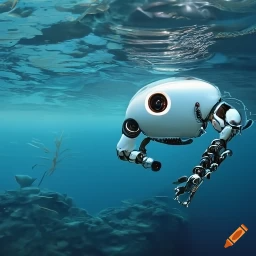One ocean. One climate. One future together.
Is AI aligned and working for this motto?
Today we celebrate the World Oceans Day, and it's worth asking what AI is doing to improve the health of our oceans.
Terms such as "data-driven oceans" or "smart oceans" do not usually come to our minds. We also don't think about the existence of AI ocean guardians. Perhaps over time they will become habitual as AI seems to be a good partner for the preservation and sustainable management of our precious marine ecosystems. From cutting-edge research to innovative technological applications, AI is revolutionizing the way we care for the oceans. Here are some tasks that show to what extent AI is shaping the future of oceans, which is our future.

Image generated in Craiyon.ai
- AI-Driven Research for Ocean Exploration
AI has propelled oceanographic research by augmenting our capacity to collect and analyze data. With the help of underwater robots and autonomous vehicles, scientists can collect vast amounts of information on marine life, oceanographic conditions, and ecosystem dynamics. AI algorithms process this data and provide valuable insights into species distribution, climate change impacts, and biodiversity hotspots and helps us develop informed conservation strategies.
- Improving Ocean Health through Environmental Monitoring
AI techs enable us to monitor and analyze numerous environmental factors that impact ocean health, such as water quality, temperature, and pollution levels. By leveraging data collected from sensors, buoys, and satellites, AI algorithms can detect patterns and anomalies, enabling early detection of harmful algal blooms, oil spills, and other pollutants. Rapid identification and response to such incidents are vital for mitigating their negative effects and safeguarding marine ecosystems.
- Crowdsourced Data Collection and Analysis
AI and blockchain can facilitate the crowdsourcing of ocean-related data and leverage the collective intelligence of individuals and organizations. Blockchain ensures the security and integrity of the data, while AI algorithms can analyze and extract insights from this vast amount of information. This approach can accelerate data collection efforts, improve research outcomes, and empower citizen scientists to actively contribute to ocean conservation.
- Risk Assessment and Resilience Planning
AI algorithms can identify vulnerable areas, assess the potential impact of climate change, and recommend adaptive measures to enhance coastal resilience and reduce the risk of future disasters. AI enables to develop early warning systems, providing timely alerts and models that simulate and forecast oceanic systems, predicting the behavior of hurricanes, cyclones, and other disasters. Predictive models based on AI support decision-making and enhance the efficiency and effectiveness of emergency response operations.
- Combating Illegal Fishing and Poaching
AI is playing a crucial role in monitoring and combating these activities, which pose significant threats to marine ecosystems and the livelihoods of coastal communities. By integrating AI with satellite imagery, data analytics, and machine learning, we can detect and track illegal fishing vessels, identify suspicious behavior, and enhance surveillance efforts. Real-time monitoring systems powered by AI algorithms enable prompt response and enforcement actions, protecting vulnerable species and preserving marine habitats.
- AI for Sustainable Fisheries Management
The fishing industry faces challenges in maintaining sustainable practices while meeting global seafood demand. AI offers solutions by optimizing fishing operations, reducing bycatch, and enabling accurate stock assessments. Machine learning algorithms can analyze historical data, including fishing patterns and environmental variables, to predict fish population dynamics and guide fisheries management decisions. AI-powered systems aid in establishing fishing quotas, implementing spatial restrictions, and promoting responsible fishing practices for long-term sustainability. AI and blockchain can be used to develop smart contracts that automate and enforce sustainable fishing practices, analyzing real-time data on fishing activities, fish stock levels, and environmental conditions to ensure the long-term health of fisheries.
- Traceability and Transparency in Seafood Supply Chains
By integrating AI and blockchain, it becomes possible to create a transparent and traceable seafood supply chain. AI can assist in data collection, analysis, and verification to ensure accurate tracking of seafood from its source to the consumer. Blockchain technology provides a decentralized and immutable ledger that records every transaction, ensuring transparency and reducing the risk of fraud or mislabeling.
- Enhancing Ocean Conservation Education and Public Awareness
AI technologies also contribute to ocean conservation education and public awareness efforts. Virtual reality (VR) and augmented reality (AR) applications provide immersive experiences, allowing individuals to explore marine ecosystems, understand their importance, and witness the impacts of human activities. AI-driven chatbots and virtual assistants can answer queries, disseminate information, and engage the public in interactive learning experiences, fostering a sense of responsibility and inspiring action for ocean conservation.
Many public and private organizations are working with AI technologies, here some examples:
National Oceanic and Atmospheric Administration (NOAA), which uses AI to improve the accuracy of weather forecasts and our understanding of climate change impacts on oceans.
United Nations Environment Programme (UNEP) and its initiative AI for good addressing environmental challenges and interesting projects such as the Global Partnership on Marine Litter (GPML).
Intergovernmental Oceanographic Commission (IOC), which promotes the AI integration into oceanographic research.
European Marine Observation and Data Network (EMODnet), aiming to improve data accessibility and develop AI-driven tools that support sustainable marine development and policy-making.
Educational projects and initiatives such as AI in education (UNESCO) and AI for Oceans.
In this day where we celebrate the relevance of oceans for life, let us recognize the immense potential of AI to build a more sustainable future for all!

Please log in or sign up to comment.